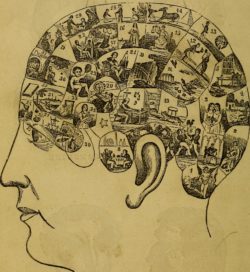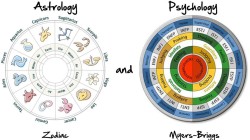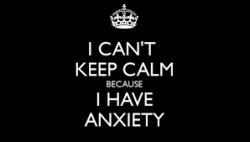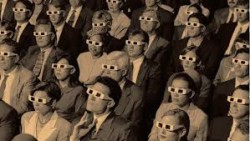Art: what could it do for our thinking brains? Café Psychologique 28 March

J. G. Sprurzheim, S, R. Wells, Education: Its Elementary Principles, Founded on the Nature of Man (1872)
What does Art mean to you? And what does it mean to your brain?
Recent studies in neuroscience are making claims that art can have an impact on our brain activity. Brain scans show that under the stimulus of an aesthetic experience, blood flow to the brain increases in the medial orbitofrontal cortex, a region associated with pleasure and desire. Other studies suggest that by studying works of art, our brains learn to perceive the world in a different way, or that art helps to trigger empathy within us by activating our mirror neurons. However fascinating these scientific accounts of a neuro-aesthetic disposition within us are, they do not necessarily tell us what we are thinking. They might offer us insights into the plays of cause and effect, stimulus and sensation, or show how synaptic regions of the brain change with the study of artistic forms, but they don’t really explain how we, ourselves, make sense of and ascribe value to our own aesthetic experiences.
This session invites you to share your experiences of art. What memories, stories, anecdotes – serious, funny, complex, simple – might you share? This could be an encounter with a painting or sculpture, a particular piece of music or poetry, an exhibition or performance? It may be a conversation you have had or overheard where a work of art is trying to be understood. It could be an inner dialogue between you and the nature of your experience. How might we begin to put into words the experiences of our own thinking about art?
This is not an academic event – this is all about sharing the stories and cultivating dialogues between us…
This café will be introduced by Dr Rowan Bailey, a senior lecturer in Art and a member of the Centre for Sculptural Thinking, University of Huddersfield. Join the conversation at Café Psychologique Leeds, on Tuesday 28 March, 8.00 pm to 9.45 pm in Seven Arts, Chapel Allerton, Leeds. The Café costs £4 on the door.
There is a poster to download here:
Café Psychologique March 2017
You can join in the conversation online on our Facebook page: Café Psychologique
You can read the Café Rules here: Café Psychologique Rules
Why so defensive? How much do we really need to protect ourselves? Café Psychologique 28 February
Did you ever find yourself doing something without understanding why you have done it? Pretending something isn’t happening, being cross at someone who doesn’t deserve it, forgetting things we need to do, having unrealistic expectations: these are all everyday examples of psychological defences – the things our minds do to protect us from thoughts and feelings that are too difficult to deal with in some way.
Although the concept of psychological defence mechanisms is often attributed to Sigmund Freud, it was his daughter, Anna, who defined them in detail. In any case, at an everyday level these are ideas that are as old as civilisation. Early Daoist philosophers, Laozi and Zhuangzi, warn that the mind easily falls into traps of seeing things in black and white terms. A process later called ‘splitting’.
This cafe will look at what psychological defences are, why we have them, whether we really need them, and what to when they get out of hand.
It will be introduced by Dr Carol Martin, a clinical psychologist and psychoanalytic psychotherapist. Join the conversation at Café Psychologique Leeds, on Tuesday 28 February 8.00 pm to 9.45 pm in Seven Arts, Chapel Allerton, Leeds. The Café costs £4 on the door.
There is a poster to download here:
Café Psychologique February 2017
You can join in the conversation online on our Facebook page: Café Psychologique
You can read the Café Rules here: Café Psychologique Rules
Bucket Lists: whose list is it anyway? Café Psychologique, 31 January, 8 pm
‘Our greatest fear should not be of failure, but of succeeding at things in life that don’t really matter.’ Francis Chan.
At the White House Correspondents Dinner in 2015, President Obama had some fun with the term ‘Bucket List’. He said:
“After the Mid-Term elections, my advisers asked me, ‘Mr President, do you have a bucket list?'” President Obama continued, “And I said, ‘Well, I have something that rhymes with ‘Bucket List’…”
The term ‘Bucket List’ was popularised by a Hollywood Film that explored the common human fear of not achieving anything of significance, and of leaving hopes or dreams unfulfilled. A bucket list might be an attempt to combat the tendency to just give up on dreams in the face of the relentless demands of daily life and work. It might also be an attempt to face down the fear of our own mortality; an attempt to die with our boots on.
This café will explore what bucket lists are, how they work, and how they can be a way to give ourselves a ‘Ctrl-Alt-Del’ reboot when life seems to have become stuck or is running like a sluggish computer. There will also be opportunity to think about what might be on your own bucket list and gain ideas from others at the café.
The café will be introduced by Terry McAndrew, a cafe regular and IT Systems Adminstrator, who found himself needing to gain fresh impetus and explore options ten years ago. He is particularly interested in how to make better decisions sooner rather than later, and definitely before it gets too late.
Join the conversation at Café Psychologique Leeds, on Tuesday 31 January 8.00 pm to 9.45 pm in Seven Arts, Chapel Allerton, Leeds. The Café costs £4 on the door.
There is a poster to download here:
Café Psychologique January 2017
You can join in the conversation online on our Facebook page: Café Psychologique
You can read the Café Rules here: Café Psychologique Rules
Strictly Come Café: Café Psychologique, 29 November
Why people dance, and how it affects us
People of all ages dance, all over the world. Some people live for it, some people loathe it, some people (very many people) follow it on television. It is used as a way of keeping fit, for artistic expression, as an act of civil protest, as means of attracting a partner, as a form of psychotherapy.
This café will explore why people dance and what effect it has on our minds as well as our bodies. As a special treat, there will also be opportunity to see some dancing and even to join in and receive some instruction for those who wish.
Dr Kay Racliffe is a clinical psychologist and ballet dancer; Andrew Wilson is a café psychologiste and ballroom dancer. Together, they will introduce our conversation at Café Psychologique Leeds, on Tuesday 29 November from 8.00 pm to 9.45 pm in Seven Arts, Chapel Allerton, Leeds. The Café costs £4 on the door.
There is a poster to download here:
Café Psychologique November 2016
You can join in the conversation online on our Facebook page: Café Psychologique
Women in Leadership: What’s it like? Cafe Psychologique, 18 October

Hillary Clinton is bidding to be the first woman to enter the White House as president while Britain has only the second female prime minister in its history. Meanwhile, fewer than 10% of board members of the top 100 companies listed on the British stock exchange are women. Only 4% of the CEOs of the world’s top 500 companies are women. The story is a little different in public, social and third sector organisations, but even where women do manage to attain leadership positions, they report being subject to stereotyping and prejudice.
This café aims to discuss what it is like to be led by a woman and what it is like to be a woman in leadership. Does it make a difference and if so what might that be? We’ll also talk about why there seem to be fewer female leaders than male, despite girls and women consistently outperforming boys and men at school and university.
Dr Frances Corrigall and Dr Ruth Hunter are clinical psychologists and will introduce our conversation at Café Psychologique Leeds, on Tuesday 18 October September from 8.00 pm to 9.45 pm in Seven Arts, Chapel Allerton, Leeds. The Café costs £4 on the door.
There is a poster to download here:
Cafe Psychologique October 2016
You can join in the conversation online on our Facebook page: Café Psychologique
Regrets? I’ve had a few… Why we make poor decisions. Café Psychologique 20 September
Have you ever made choices which you later regretted? Of course you have!
From hair-styles to Brexits, from life partners to Gulf wars, we all make choices and decisions which later fill us with horror. What is it that makes you feel regretful, or stand your ground, or even repeat the bad decisions – sometimes endlessly? Does the realisation that you’ve made poor choices in the present change the way you make decisions in the future?
Tony Blair followed Bush into Iraq. Disaster. Then he followed the US into Afghanistan. Bigger disaster. Now the UK is supporting America in attacking Syria. We wonder how that will work out? Or, maybe, you think that these were good decisions and we are all freer and safer now than we were before these wars. Why is that? Why does one person see disaster where another sees success?
At this Cafe Psychologique we shall ask these important questions. So, please join us for an evening you won’t regret.
Hmmm… We now wish we’d chosen a different topic.
Dr Elaine McMullan is a Clinical Psychologist and Philip Malone is a psychotherapist. They will introduce our conversation at Café Psychologique Leeds, on Tuesday 20 September from 8.00 pm to 9.45 pm in Seven Arts, Chapel Allerton, Leeds. The Café costs £4 on the door.
There is a poster to download here:
Café Psychologique September 2016
You can join in the conversation online on our Facebook page: Café Psychologique
Typical Taurus or Total Bull? Café Psychologique, 26 July
Astrology, Personality Types and What Makes Us Who We Are
People have believed for centuries that your time and date of birth are of great significance in understanding your personality and the type of person you are. While astrology remains outside the scientific mainstream, there are a host of psychological models for describing and defining personality types, such as the popular Myers Briggs Type Indicator. However, the evidence base for these is often little more robust than that for astrology.
Is personality something that can be defined into types or is each person a unique entity with distinctive traits all of their own? More than that, is personality something you are born with, whether defined by your genes or the alignment of the planets, or something that is shaped by your upbringing and your environment? Can we even talk of someone having a single, definable personality when it is clearly the case that many people change how they behave and what they are like, depending on where they are and who is with them.
Maybe the most critical question is whether we can change (or expect others to change), or whether – in the words of Popeye – ‘I yam what I yam!’, and our personality is something defined and fixed.

Ruth Sutherland is a Clinical Psychologist and she will help us explore these questions and more at Café Psychologique Leeds, on Tuesday 26 July, from 8.00 pm to 9.45 pm in Seven Arts, Chapel Allerton, Leeds. The Café costs £4 on the door.
There is a poster to download here:
Café Psychologique July 2016
You can join in the conversation online on our Facebook page: Café Psychologique
Anxiety? Don’t worry about it. Café Psychologique 21 September
Worried you might have anxiety? How would you know if you have anxiety as a treatable, clinical problem, or are just a bit of a worrier? Repeated studies suggest that 1 in 4 people in England experience a mental health problem in any given year; of those, generalised anxiety and depression is the most common problem by far. The UK Wellbeing Survey in 2013 found that nearly 1 in 5 people over 16 showed symptoms of anxiety or depression.
Anxiety comes in many forms: from sleepless nights worrying, to phobias of particular situations or things; from panic attacks where you think you are going to die, to an inability to concentrate, plan or make decisions.
This Café will help you understand what anxiety is, how it affects you and others, and what others have found to be helpful in dealing with it. It’s not as easy as just stopping worrying, but there are things that can help you manage it and even understand what’s causing it in the first place.
Dr Fiona Thorne is a Clinical Psychologist with wide experience in dealing with anxiety. She will introduce our conversation at Café Psychologique Leeds, on Tuesday 21 June from 8.00 pm to 9.45 pm in Seven Arts, Chapel Allerton, Leeds. The Café costs £4 on the door.
There is a poster to download here:
Café Psychologique June July 2016
You can join in the conversation online on our Facebook page: Café Psychologique
Swipe Right or Left – Café Psychologique 31 May
Relationships in the age of mobile and online dating
The popular mobile dating app, Tinder, allows its users to swipe left or right on potential partners in order to establish compatibility. A recent BBC Horizon program about how to find love online, explored the intricacies of meeting a potential partner through mobile apps like Tinder and other online dating forums. A Ted Talk entitled How I Hacked Online Dating has had nearly 5 million hits.
How does this new way of meeting potential partners change our perspectives and values of relationships? How does this experience compare to how things were before technology could be used in this way? Is it easier or harder to find love in the age of technology?
Of course, Café Psychologique is the perfect environment to talk about this, as it’s been described by one participant as ‘like Twitter, but in person with real people’. So you might learn something, and might even meet someone new. In any case you’ll have chance to talk, listen, think and understand online dating from a psychological perspective
This Café Psychologique will explore dating, relationships, and the digital world. Stephen Mayer is a Clinical Psychologist in training and will introduce our conversation at Café Psychologique Leeds, on Tuesday 31 May from 8.00 pm to 9.45 pm in Seven Arts, Chapel Allerton, Leeds. The Café costs £4 on the door.
There is a poster to download here:
Café Psychologique May June July 2016
You can join in the conversation online on our Facebook page: Café Psychologique
Cult Film or Comfort Blanket: Why some films are so special to us. Café Psychologique 29 March
In a world colonised by Hollywood Blockbusters there have always been films that have attracted little attention at first, but have grown to be dear to some. Over time, some cult films have gone on to greater critical acclaim and larger audiences than many films with the instant appeal generated by large marketing campaigns.
The appeal of some of these films is readily comprehensible as in Donny Darko, Monty Python and the Holy Grail or The Blues Brothers, whether you personally enjoy them or not. But others seem completely inaccessible to all but their most dedicated devotees, such as Troll 2 or A Woman, a Gun, and a Noodle Shop.
As Rolling Stone put it ‘There’s no single way to recognize a cult movie other than the simple fact that it’s developed a fiercely devoted audience that watches it over and over, preferably at midnight in a theater packed with other die-hards.’
What is indisputable is that particular films become very important to particular people and many of us have films that we turn to time and time again, whether or not they are cool, critically acclaimed or even appreciated by anyone else we know.
This Café Psychologique will explore what makes particular films special to us. Alison Andrews is a writer and performer, with a life long love of film. She will introduce our conversation at Café Psychologique Leeds, on Tuesday 29 March from 8.00 pm to 9.45 pm in Seven Arts, Chapel Allerton, Leeds. The Café costs £4 on the door.
There is a poster to download here: Café Psychologique March May June 2016
You can join in the conversation online on our Facebook page: Café Psychologique
Category






